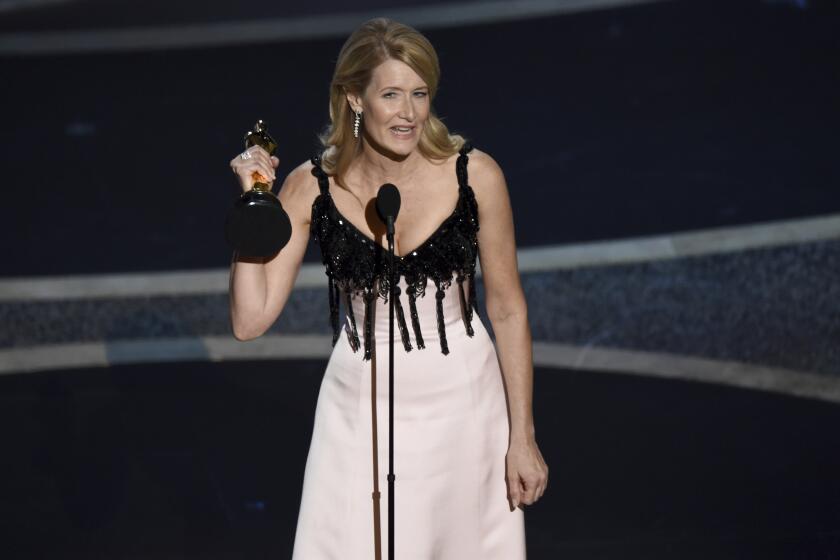Oscars telecast draws 9.85 million viewers for ABC, a record low
- Share via
Despite a night of historic firsts and a major upset in the best actor category, the 93rd Academy Awards could not avoid the TV ratings slide that has hit awards shows during the pandemic.
ABC’s telecast of the Oscars hit an all-time low with an average of 9.85 million viewers watching on Sunday, a drop of 58% from last year according to Nielsen. The previous low was in 2020 with 23.6 million viewers.
For the record:
4:40 p.m. April 27, 2021An earlier version of this post in correctly described the the award given to Yuh-Jung Youn, who was the first Korean performer to win the supporting actress Academy Award.
Oscar telecast producers Steven Soderbergh, Stacey Sher and Jesse Collins were up against the same obstacles faced by other awards shows that experienced similar ratings declines. The Golden Globe Awards (6.9 million viewers on NBC) and the Grammy Awards (8.8 million viewers on CBS) both had year-to-year audience decreases of more than 50%.
While an audience of 9.85 million viewers is higher than most network prime-time TV shows, it pales in comparison to regular-season NFL football telecasts, which averaged 15 million viewers this past season.
The Oscars is typically the most-watched non-sports program of the year, but that won’t be the case in 2021. CBS’s post-Super Bowl premiere of “The Equalizer” scored more than 20 million viewers, and Oprah Winfrey’s interview with Prince Harry and Meghan Markle on the network delivered 17.1 million viewers on March 7.
The audience for ABC’s Oscars telecast will likely rise when out-of-home viewing and streaming are added in. But it won’t change its status as the least-watched Oscars ever.
The Oscars show aired nearly two months later than it has in recent years, and the live audience in attendance was limited with fewer than 200 participants seated in a banquet-like setting at Union Station in downtown Los Angeles. With limited exposure in movie theaters that were mostly closed over the last year, many TV viewers were unfamiliar with the nominated films, which may explain why clips were used less than usual.
Big ratings declines for the Grammys and Golden Globe Awards have the TV industry wondering how low the Oscars could go.
The show proceeded without a host. The only comedy bit occurred when actor Lil Rel Howery quizzed Oscars attendees on famous film music played by DJ Questlove. Lead actress nominee Glenn Close played along with her performance of the dance to “Da Butt” from Spike Lee’s “School Daze.”
For the most part, the introductions were earnest and lacked the humor and irony that were trademarks of Hollywood awards shows. A lengthy segment on the Motion Picture & Television Fund had the feeling of a fundraising telethon.
While there is anecdotal evidence that viewers are turned off by social justice speeches at show-business awards shows, the Oscar winners and presenters did not shy away from referencing the police murder of George Floyd. Former Minneapolis Police Officer Derek Chauvin was convicted last week for Floyd’s May 25 death.
“We are mourning the loss of so many, and I have to be honest, if things had gone differently this past week in Minneapolis I may have traded in my heels for marching boots,” Regina King, the director for “One Night in Miami,” said at the outset of the show.
Best picture is traditionally the last trophy given out, but the Oscars telecast had a major twist in presenting that award before the lead actress and actor categories. The last time the telecast did not end with the best picture award was in 1972 when the winner was “The French Connection.”
The switch may have been an attempt to keep viewers hooked to the end of the telecast. Best picture winner “Nomadland” was considered a foregone conclusion based on its sweep of other awards, including the Golden Globes and BAFTA. Viewers may have anticipated a warm tribute to Chadwick Boseman, the late actor who was expected to be posthumously honored for his performance in “Ma Rainey’s Black Bottom.”
But Boseman lost in a stunning upset to Anthony Hopkins for his performance as an elderly dementia sufferer in “The Father.” Hopkins was not present at the ceremony, which ended with a still image of him.
According to a representative for the film, Hopkins, 83, was in his native Wales. In order to avoid the risk of being exposed to the coronavirus, he did not travel to the British Film Institute in London where other nominees accepted awards. The show’s production team insisted on in-person acceptance speeches to avoid the use of Zoom calls that diminished the production standards of other awards shows.
The category switch may have given a slight boost to the rating. Nielsen measures the audience for the Oscars through the last national commercial break, which came before the acting categories were presented. It gave the program an unusually early end time of 11:10 p.m. Eastern. Once the Oscars goes past 11 p.m, the telecast is competing with bedtimes in most of the country.
Those who stayed up saw history made as Hopkins was the oldest lead actor winner in history, one of several Oscar landmarks set that night.
Chloé Zhao was the first woman of color to win a director trophy for her work on “Nomadland.” “Ma Rainey’s Black Bottom” costume designer Ann Roth, 89, became the oldest woman to win an Oscar. “Minari” star Yuh-Jung Youn became the first Korean to win for supporting actress.
More to Read
Inside the business of entertainment
The Wide Shot brings you news, analysis and insights on everything from streaming wars to production — and what it all means for the future.
You may occasionally receive promotional content from the Los Angeles Times.












